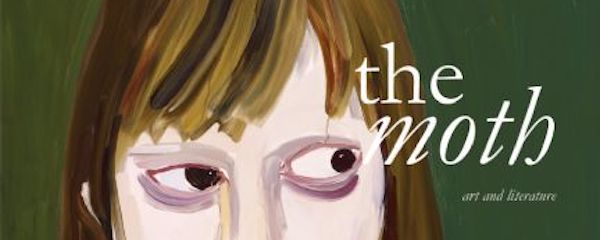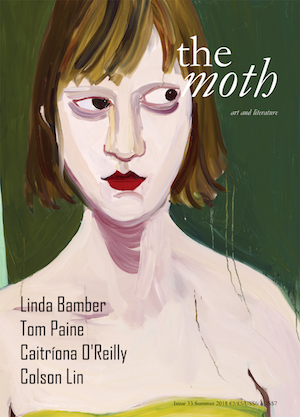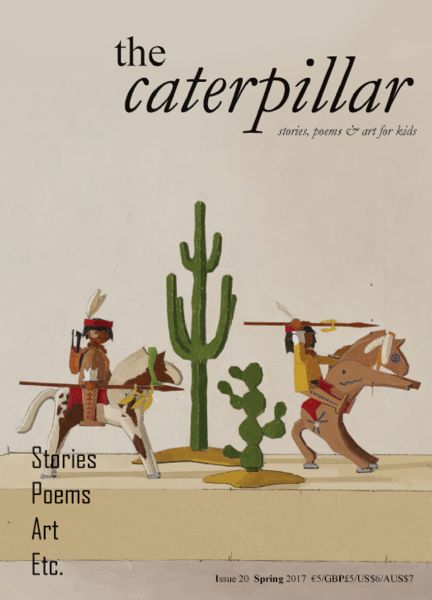
(© The Moth Magazine)
AN INTERVIEW WITH REBECCA O’CONNOR, EDITOR OF THE MOTH
by DAVID FRANKEL
For readers and writers of the short story, literary magazines are an ideal platform. They give new writers an opportunity to show their work and build a readership, and give better-established authors a place to experiment with form and ideas.
Magazines and journals are often more inclusive and diverse than publishing houses – lighter on their feet, able to challenge and speculate. Each magazine has its own distinct identity, and each attracts a following of readers passionate about the short story. Few of them seek outside funding, fewer still receive it, often operating on a minimal budget, and yet they soldier on.
Their editors are the gatekeepers who spend their time reading submissions, producing the magazine, finding new readers and organising events. So, we decided to try and get inside the heads of these unsung heroes of the short-story world in a series of interviews. In the second of this series, David Frankel talks to Rebecca O’Connor of The Moth.
~
The Moth was founded in 2010 by Rebecca O’Connor and Will Govan. Since then it has gained a large international readership and considerable critical acclaim. It is published quarterly and contains short fiction and poetry by new and established writers as well as artwork and interviews.
Rebecca is co-founder and director of The Moth. Her debut poetry collection, We’ll Sing Blackbird was shortlisted for the Strong Shine Award and she is a recipient of a Geoffrey Dearmer Prize from Poetry Review. Her debut novel, He is Mine and I Have No Other, has just been published by Canongate.
 David Frankel: How would you describe The Moth?
David Frankel: How would you describe The Moth?
Rebecca O’Connor: It’s an eclectic mix of poetry, fiction and art from around the world, from some of the finest practitioners around – and all of it is unsolicited.
DF: What does a day in the life of the editor of The Moth look like?
RO: That depends on the time of year. I work in three-monthly cycles, so there are times of intense reading, and then editing and layout and design, and then distribution. All the while there are administration duties, websites to maintain, and accounts, and various other bits and bobs to attend to. I like to chop and change throughout the day, to keep myself on my toes, so I might spend a few hours reading submissions, then have a break from that to search online for artwork. Sometimes, when I’m completely exhausted, I love just stuffing envelopes.
DF: Starting and running a literary magazine is tough. Why would an otherwise sane person do that to themselves?
RO: It’s a good question. I don’t think my husband Will and I were sane at the time. We’d moved, with our baby, from London to rural Ireland during the height of the recession. We were sleep deprived. And we were desperate to make something of our situation.
DF: How did The Moth start its life?
RO: We had a rare night out in Dublin, when our little boy was two, and over dinner we decided it would be a brilliant idea to start publishing a literary magazine. That was that. No business plan. Just thought we’d see where it went.
DF: Do you remember the first short story that really made an impression on you?
RO: Yes, I do. It was an epistolary story by Thomas Maloney called ‘Paperchase’. I couldn’t believe that he’d had little published at the time, it was so exquisitely written. His novel, The Sacred Combe, was subsequently longlisted for the Desmond Eliot Prize. I also remember being struck by a Thomas Morris story entitled ‘Lost Cause’, which we published back in 2012.
DF: What short stories do you read when you’re off-duty?
RO: Not too many, to be honest, as there are so many to get through for work. Although, having said that, I’ve been loving Miranda July. I’ve got the new William Trevor ready to read, and a Lorrie Moore compendium.
DF: Since The Moth began in 2010, you’ve published a wonderful, and varied, array of writers. What do you look for in a short story when you’re considering what to include in The Moth? Do the stories you select reflect your own taste or broader considerations?
 RO: It’s purely whatever excites me. And it’s a very instinctive response. I hope that if it excites me it’ll excite others too. I can’t try to second-guess our readers. That would be disastrous, I think. Other tastes come into it too, when we publish the winners of The Moth Short Story Prize and the €10,000 Moth Poetry Prize, judged by a different writer each year. This year it’s Kevin Barry and Jacob Polley.
RO: It’s purely whatever excites me. And it’s a very instinctive response. I hope that if it excites me it’ll excite others too. I can’t try to second-guess our readers. That would be disastrous, I think. Other tastes come into it too, when we publish the winners of The Moth Short Story Prize and the €10,000 Moth Poetry Prize, judged by a different writer each year. This year it’s Kevin Barry and Jacob Polley.
DF: So you don’t have a particular audience in mind when you are crafting each issue?
RO: No, not really. I just hope that if I love something others will love it too. Not every reader is going to like everything I choose, but I guess they’ll find something that appeals to them – whether it’s a poem, or a story, an interview, or a work of art.
DF: How do you go about shaping each issue?
RO: I start with a cover, and try to book interviewees up well in advance. Then I wade through the submissions for poetry and fiction – all of it unsolicited – until I have maybe half or three-quarters of what I need. Then I’ll feel inspired to look for art that I think will spark with the work in that particular issue.
DF: Art is a big part of The Moth. As well as being a great read it’s visually beautiful. What made you decide to embrace visual art alongside the written work?
RO: It seemed natural. Will is a painter, and I’ve always loved art. I studied it at school, and dabbled a bit in painting when I was younger. We both loved the idea of creating a magazine that was beautiful to look at and to hold. It also smells lovely.
DF: Do you work with authors in terms of the editing of their stories?
RO: Yes, I will work with authors editorially, make suggestions. If I think something needs a lot of work, I’ll mention that before they commit to allowing us to publish it. Otherwise, it’s a light edit.
DF: I was once told that the road to bankruptcy was paved with short stories. How does the magazine fund itself?
RO: We had some help from the government’s ‘back to business’ scheme for the first few years. We branched out into literary prizes early on, which helped subsidise the magazine, Will ran a theatre production company briefly, and I did some freelance editorial work. We now have The Moth Retreat too. We’ve just built it up incrementally, tiny steps, and lived on beans.
DF: The Moth International Short Story Prize, and separate Poetry Prize, are amongst the biggest and most generous competitions in the writing calendar. How important are they in terms of attracting new readers and writers to the magazine?
 RO: They are so vital. They draw new people to the magazine all the time. And they create a kind of frisson and excitement about it. And of course we absolutely love being able to highlight some of the incredible work that comes our way, and offer writers monetary awards and recognition that can help to alter the course of their publishing careers.
RO: They are so vital. They draw new people to the magazine all the time. And they create a kind of frisson and excitement about it. And of course we absolutely love being able to highlight some of the incredible work that comes our way, and offer writers monetary awards and recognition that can help to alter the course of their publishing careers.
DF: You also run The Caterpillar, a sister publication featuring stories and poems for children. How did this come about?
RO: It seemed that the only magazines available to children were merchandise-driven by big companies, and were just full of colouring in and mazes. We wanted to make really good literature and art as accessible to children as it is to adults. We wanted them to be able to pick it up in the newsagent. And of course we really wanted to brainwash children from an early age, so that the natural progression would be from The Caterpillar to The Moth!
DF: As a writer yourself, has your experience of being an editor changed your work in any way?
RO: I think it changes my work all the time. It inspires me, teaches me the pitfalls, gives me things to aspire to, keeps me up to date and on my toes.
DF: What can readers expect in the future?
RO: The Moth Short Story Prize winners in the autumn issue, chosen by Kevin Barry. Interviews with Kit de Waal and Medbh McGuckian. An extraordinary piece of writing from Max Porter in the winter issue. Stunning art from the winner of The Moth Art Prize, The Moth Poetry Prize judged by Jacob Polley …
DF: Where can we find a copy of The Moth?
RO: It’s in select bookshops in London, Paris, Dublin, New York and elsewhere, but the best bet is probably to order a copy at www.themothmagazine.com for just €7 (including postage worldwide).
~
David Frankel ’s short stories have been published in anthologies and magazines including Unthology 8, Prole, Lightship Anthology and The London Magazine. His creative non-fiction and reviews have been published in various journals and publications both online and in print. He also works as an artist and edits work for other writers.
’s short stories have been published in anthologies and magazines including Unthology 8, Prole, Lightship Anthology and The London Magazine. His creative non-fiction and reviews have been published in various journals and publications both online and in print. He also works as an artist and edits work for other writers.

One thought on “Editor Interviews: Rebecca O’Connor, The Moth”
Comments are closed.